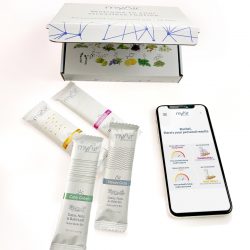Food Tech Startup of the Week is a series of interviews with founders and CEOs of Israeli startup companies in the Food Tech industry, in a collaboration with the ACT Hub. We share their stories about early struggles, growth, and success, in the hopes of providing some insight for entrepreneurial spirits looking to walk in their footsteps.
This Week's Startup: BugEra
BugEra produces strains of the Black Soldier Fly (BSF) through genetic engineering to create new sustainable and safe products that tackle environmental challenges such as biodiesel production.
Female founded startup BugEra, was one of the six finalists chosen for the Women of Agrifood Nation Competition. The event took place on June 6, 2021 at the Peres Center for Peace and Innovation. At this event, Dr. Anna Melkov, the founder of BugEra, pitched her business to a panel of food tech experts. The goal of the competition was to increase recognition for women-led startups in the food tech industry.

Chief Technology Officer (CTO), head of R&,D and female founder of BugEra, Dr. Anna Melkov competed in the second annual Women of Agrifood Nation Competition pitching event.
BugEra produces strains of the Black Soldier Fly (BSF) through genetic engineering to create new sustainable and safe products that tackle environmental challenges such as biodiesel production.

We had the great pleasure of interviewing Dr. Anna Melkov and hearing about her experience.
How have you felt on your journey to where you are today?
“I feel like I’ve gained more confidence both in the context of my idea validation and in my public speaking skills. The feedback I’ve got from the mentors helped me to clear the message and made me more precise both on my vision and presenting skills. Since my background is fully academic, it was not easy for me to adjust to the new format of information flow and oral presentations needed in the field of startups. Moreover, I’ve learned to make scientific ideas accessible and clear to a wide range of audiences.”
How did the event help you reach your goals?
“I have got a lot of very useful insights and perspectives on the field of business aspects and strategies from leading experts. I do not think I had clearly defined goals when I filled out the application form, but now I believe I have a bigger picture and my realization of the processes has expanded.”
What’s next?
“Next, we are heading into the real world, while my “toolbox” has increased with all the useful and practical ideas I’ve got during mentoring sessions.”
What were some of the key moments in your journey?
“The last couple of months were very tense and time-consuming, however, the supporting atmosphere created by Carmit Oron and Hamotal Gozlan made it fun! So, the key moment for me was not the final pitch and “after-party event”, it was getting to know the amazing people behind it.”
What motivates you to keep going when you get turned down, especially as a woman in this sector?
“My biggest motivation is my daughters, I believe that I must provide a personal example for my girls. This realization gives me the power to keep going even when I get “NO”. Moreover, my passion for science drives me on a day-to-day basis, I am crazy about what I do. I am a dreamer, a scientist, and a mother, who cares and takes action in facing the global climate challenges endangering the basic future food security of my daughters. I may sound naïve, but I believe that my motivation is a very strong driving force for accomplishing my goals as a scientist and a woman.”
In your experience, what has been the biggest challenge working in a startup as a woman, and how do you find ways to overcome/these challenges?
“As a woman, the most difficult part of building a startup is to combine very demanding work with family. I am lucky to have a very supportive husband, who shares my vision, believes in me, and takes responsibility at the day-to-day routine level. I do not consider that being a woman is a restraint, weakness, or excuse. However, I do realize that the way we treat and educate our daughters should change fundamentally. Before I have started my way to the business world, I did not even understand the real meaning of women's discrimination, because I didn’t face it by myself. Recently I’ve been participating in numerous meetings and I find myself in a conference room as the only woman present. So, to date, the term is very evident to me, as women are under-represented in the world of business. One of the mentors (Ravital Kramer) said to me that I should embrace and appreciate every woman I meet on the way. I think that’s the main lesson I’ve learned and I’m going to implement it on my journey.”
Dr. Anna Melkov said, “I’d like to thank the “Women of Agrifood Nation” competition organizers, they did amazing work, and invested tremendous effort. I must admit that I was a little bit skeptical about women's competition, however, it turned out to be an exquisite journey, which I have enjoyed.”

The judges and those in attendance at the event were more than impressed with Melkov’s business pitch for BugEra. ACT FoodTech looks forward to seeing BugEra grow among the food-tech industry.




